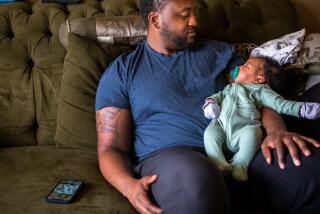To Sleep, Perchance to Survive
- Share via
Normally more than articulate, the intern was having a good deal of difficulty stringing words together, not to mention maintaining an upright position independent of the wall he was leaning against. He’d been on call through the long night and now faced a fresh onslaught of patients with equally pressing problems in the morning clinic. It became my job as attending physician to make sure this young doctor’s long hours didn’t impair patient care. Fortunately, his training had been so thorough that his medical skills held strong in the face of his overwhelming fatigue. When he went home to catch a few hours’ sleep before his next shift, his young wife, having expected that her new marriage would bring a modicum of romance, instead would be contending with a mate whose only remaining drive was for rest. More than one medical marriage has foundered on the shoals of sleep deprivation.
Though physicians pretty much have to be alert any time of day or night, theirs is far from the only profession to ignore the human need for shut-eye. Increasing numbers of industries, attempting to save on benefits and training costs, demand more overtime of the employees they do have. Today’s worker averages two more weeks on the job a year than his or her parent put in a generation ago. Most women must find the time for two jobs: parenting and paid employment. Our country is distinct from many other developed nations in our emphasis on work as the supreme human activity. Most Europeans enjoy far more holiday time and retire earlier than do we Americans. Perhaps the only other nation to flagellate itself so thoroughly with work is Japan, a nation that has coined a word, “karoshi,” to describe death by overwork.
What are the wages of these sins against our collective national biology? For starters, we’re meaner. One study in the journal Sleep analyzed almost 2,000 people and reached the conclusion that everyone knows intuitively: Sleep deprivation greatly affects mood, ability to think and motor skills. Police accident reports show that 1.4% of all accidents and close to 4% of all fatal crashes are caused by falling asleep while driving. Disasters that have been related at least indirectly to sleep deprivation include Three Mile Island and the Exxon Valdez oil spill.
Since we’re collectively working even longer nowadays, the potential for personal and environmental catastrophe will only grow worse. Add to that the fact that the more children a woman has, the more likely she is to request shift or night-time work to free her days for family responsibilities, and you have a pretty volatile brew.
This situation was visited upon a baby I treated not long ago, who was being cared for by his young parents at frightening physiological cost. His mother worked nights as a janitor, scrubbing bathrooms and cleaning offices. His father, a laborer, worked days. Both parents clearly loved their child enough to make huge sacrifices so they could raise him themselves, yet both appeared exhausted from the effort and the additional stress of his illness. With their conflicting schedules, it didn’t look like they got together often enough to provide a sibling. Unfortunately, theirs is not an unusual solution to the problem of making enough income to support a family while being there to take care of that family.
Maybe somebody in politics ought to look at this. Sleep deprivation is known to be related to a variety of health problems. Long hours at work increase the risk of miscarriage and preterm delivery. We might be able to save some health care bucks by resting our workers a bit better. Who knows what statistics we could generate if we examined sleep deprivation-related divorces, child abuse, depression or the prevalence of lighting up a cigarette or eating a chocolate bar to keep oneself awake. Anybody out there for making a good night’s rest a family value?






